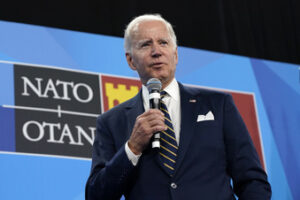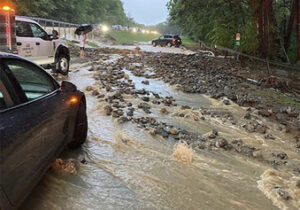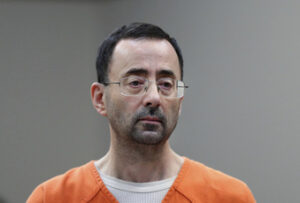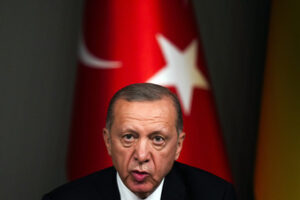Rockets fired at Israel from Lebanon raise risk of conflict
4 min read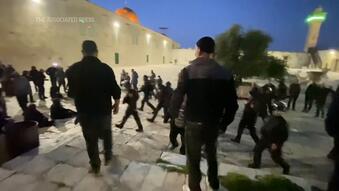
JERUSALEM (AP) — Militants fired a heavy barrage of rockets from Lebanon at Israel on Thursday, the Israeli military said, forcing people across Israel’s northern frontier into bomb shelters, wounding at least one person and ratcheting up regional tensions as Israelis celebrated the Jewish Passover holiday.
Israel’s military said 34 rockets had been fired across the border, and that 25 were shot down by its Iron Dome aerial defense system. Another five fell inside Israeli territory and the rest were being investigated, it added. The army said its response would come after “a situational assessment” and meeting by Israel’s Security Cabinet later Thursday.
The Iran-backed militant group Hezbollah holds power in much of southern Lebanon, a flashpoint with Israeli forces. Thursday’s rocket fire raised fears of a wider conflagration. Over the past two days, tensions have skyrocketed at Jerusalem’s most sensitive holy site and along Israel’s border with the Gaza Strip.
The U.N. peacekeeping force in south Lebanon, known as UNIFIL, said in a statement that there had been “multiple rocket launches from southern Lebanon toward Israel” and the Israeli army had informed UNIFIL that it activated its Iron Dome defense system in response.
“The current situation is extremely serious,” said Maj. Gen. Aroldo Lázaro, the head of the peacekeeping force, adding that he’s been in touch with both Lebanese and Israeli authorities. “UNIFIL urges restraint and to avoid further escalation.”
Earlier on Thursday and late Wednesday night, Palestinian militants in Gaza had fired rockets toward Israel in protest over an escalation at the holy Al-Aqsa Mosque compound in the heart of Jerusalem’s Old City.
No faction in Lebanon claimed responsibility for the salvo of rockets, which set off air raid sirens across the country’s north. Israeli media estimated it to be larger than previous launches from Lebanon in recent years.
Lebanese security officials, who spoke on condition of anonymity because they were not authorized to brief the media, said the rockets had been fired from the area of a Palestinian refugee camp — suggesting that the rockets had been fired at Israel by Palestinian militants based in Lebanon.
Israel and the Lebanese group Hezbollah fought a monthlong war in 2006 that ended inconclusively. Since then, the border has remained tense but mostly calm. Palestinian militants have also launched rockets into Israel on several occasions, drawing quick but limited Israeli retaliation.
Israeli medics reported that a 19-year-old male was hit by shrapnel and mildly wounded, while a 60-year-old woman was injured after falling as she sprinted to a bomb shelter.
Videos on social media showed massive plumes of dark smoke billowing from Israel’s northern hills and streaks through the sky left by the Iron Dome system. Widely circulating photos showed shrapnel that struck a street in the northern Israeli town of Shlomi and at least one building with its windows blown out.
Lebanon’s state-run National News Agency reported that Israeli tanks along the border fired shells toward two southern Lebanese towns near the Rashidiyeh Palestinian refugee camp in retaliation — a claim denied by the Israeli military.
The Palestinian militant group Islamic Jihad hailed the rockets as “a heroic operation against the Israeli crimes in the Al-Aqsa Mosque.” The leader of the Palestinian Hamas group that rules Gaza, Ismail Haniyeh, also arrived in Beirut on Wednesday, Lebanese state media reported.
The compound home to the Al-Aqsa Mosque is the third-holiest site in Islam and stands on a hilltop known to Jews as the Temple Mount, revered as the holiest site in Judaism. Conflicting claims over the site have spilled into violence before, including a bloody 11-day war two years ago between Israel and Hamas, the Islamic militant group that rules Gaza.
For the past two nights — a volatile time during which the Muslim holy month of Ramadan and the Jewish holiday of Passover overlap — Palestinians have tried to barricade themselves in the mosque in protest over threats by religious Jews to sacrifice animals at the sacred site and over perceived Israeli restrictions to Muslim prayers.
Palestinians have been trying to pray overnight at the mosque, which authorities typically only permit during the last 10 days of the monthlong holiday. In the last days, Israeli police have stormed into the mosque to evict worshippers, firing tear gas and stun grenades and fiercely beating Palestinians, who set off firecrackers and hurled stones. Israeli authorities control access to the area but the compound is administered by Islamic and Jordanian officials.
Lebanon’s militant Hezbollah group condemned the storming of the mosque, calling it “a flagrant violation of believers in Jerusalem that violated religious, moral and human values.”
Muslim leaders around the Middle East have criticized the Israeli actions in Al-Aqsa, including Turkish President Recep Tayyip Erdogan, whose country recently reconciled with Israel and restored full diplomatic ties.
“Interventions and threats against the historical status and spirituality of Al-Aqsa Mosque as well as the Palestinians’ right to life and religious beliefs must come to an end,” Erdogan told Turkey’s 24 TV.


